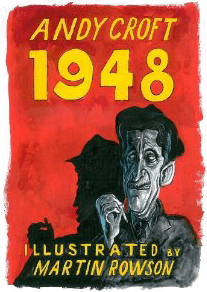
Contact
Nineteen Forty–eight
 Illustrated by Martin Rownson
Illustrated by Martin Rownson
Price: £7.99
ISBN: 9781907869327
Britain 1948. As Londoners rebuild their city after six years of war, people are looking forward to hosting the Olympic Games. But the Cold War is already closing in. When the Red Army liberated Paris, Churchill spoke of a curtain coming down across the Channel. Now he is in Washington, the Royal Family have fled to Rhodesia and TS Eliot is broadcasting on Radio Free Europe from Franco's Spain. The US calls for a boycott of the London Olympics and threatens to impose an economic blockade on Britain, a dock–strike looks set to exploit growing tensions in the Labour–Communist government.
When DC Winston Smith is asked to investigate the black–market, the bloody clues lead gim across London to the set of Passport to Pimlico. As the body–count increases, so do the attentions of various security services and literary critics. Then someone gives Smith an unpublished novel set in 1984 and depicting a truly horrible future. Can History be stopped? Is it an Ealing Tragedy? Or just a Cold War joke in Pushkin sonnets?
The wharf rat slips behind a derrick And disappears into the night. (To make it seem more atmospheric This scene is filmed in black and white.) The headlights of a truck grow bigger, Then fade away. Some steps. A figure. He stops to light a cigarette. It's hot. His shirt is damp with sweat. This heat wave shows no sign of stopping. He checks his watch and wipes his brow. His contact should be here by now. The moon that shines tonight on Wapping Looks like it badly needs a drink. The clouds move in. The shadows shrink. I'd like to pause here for a second In critical parenthesis, And ask if you have ever reckoned How hard it is to write like this? It don't come cheap, this kind of writing – The dockland scene, the low–key lighting, The morally ambiguous tone, That late night, smoky saxophone. Don't get me wrong, I'm not complaining, I'm partial to a spot of Noir, The problem is, you won't get far Without a lot of special training, Especially when it has to rhyme. And that, these days, means cash and time. That said, I think I ought to mention That no expenses have been spared On character, dramatic tension Or complicated plots, compared To which your average Peter Wimsey Looks pretty bloody thin and flimsy. The shadows on my flickering screen Are shot in black and white and Greene; Here every mood's subdued, crepuscular; Like Hammett, Cain and Hemingway The only ink I've used is grey; The verbs are manly, strong and muscular, The adjectives are hard and taut. Some sentences. Are very. Short.
'Croft has always written poems with full rhyme and solid rhythms, but now with both a previous novella Ghost Writer and long poems in Three Men on the Metro in Pushkin sonnet sequences, he seems to be demonstrating a predilection for this horrendous form and is probably now its leading exponent in English.'
Stride
'there is something inherently comic and subversive in the form that Croft has chosen, so it would perhaps be best if you did not really approach it as a whodunnit. Or even, in some respects, as a poem. Even though its prosody is spot-on... Fine indeed; very fine, really, perfectly precise and commanding...'
Guardian
'A wholly original conceit and Croft's reworking is an imaginative leap of wishful thinking underpinned by razor-sharp political sideswipes which certainly resonate with our own times... A comic-verse novel with excellent illustrations by Martin Rowson, it ram-raids the Pushkin sonnet form to construct an alternative vision to Orwell's satire... As an example of political verse, 1948 has to rank as one of the most accomplished achievements of the year so far.'
Morning Star
'I wouldn't call this poetry. It is satirical – political – verse that often has an 18th century ribald savagery reminiscent of Hogarth or Swift... funny, gutsy and outspoken.'
Camden New Journal
'a tour de force...alongside some of Croft's best passages, the work of certain other celebrated poets can feel rather academic and self-indulgent.'
London Grip
'an audacious tour-de-force... Give the man a medal!'
The Journal
'Andy Croft is a veteran versifier whose vital and prolific oeuvre has ever gone energetically against the grain of mainstream poetic acedia. In many ways he is the natural successor to both Adrian Mitchell and Tony Harrison... but Croft is a poet distinctive in his own right for his infectious and defiant infusion of humour into the fundamentally serious and compelling themes he tackles... This is first-rate literary comedy.'
The Recusant